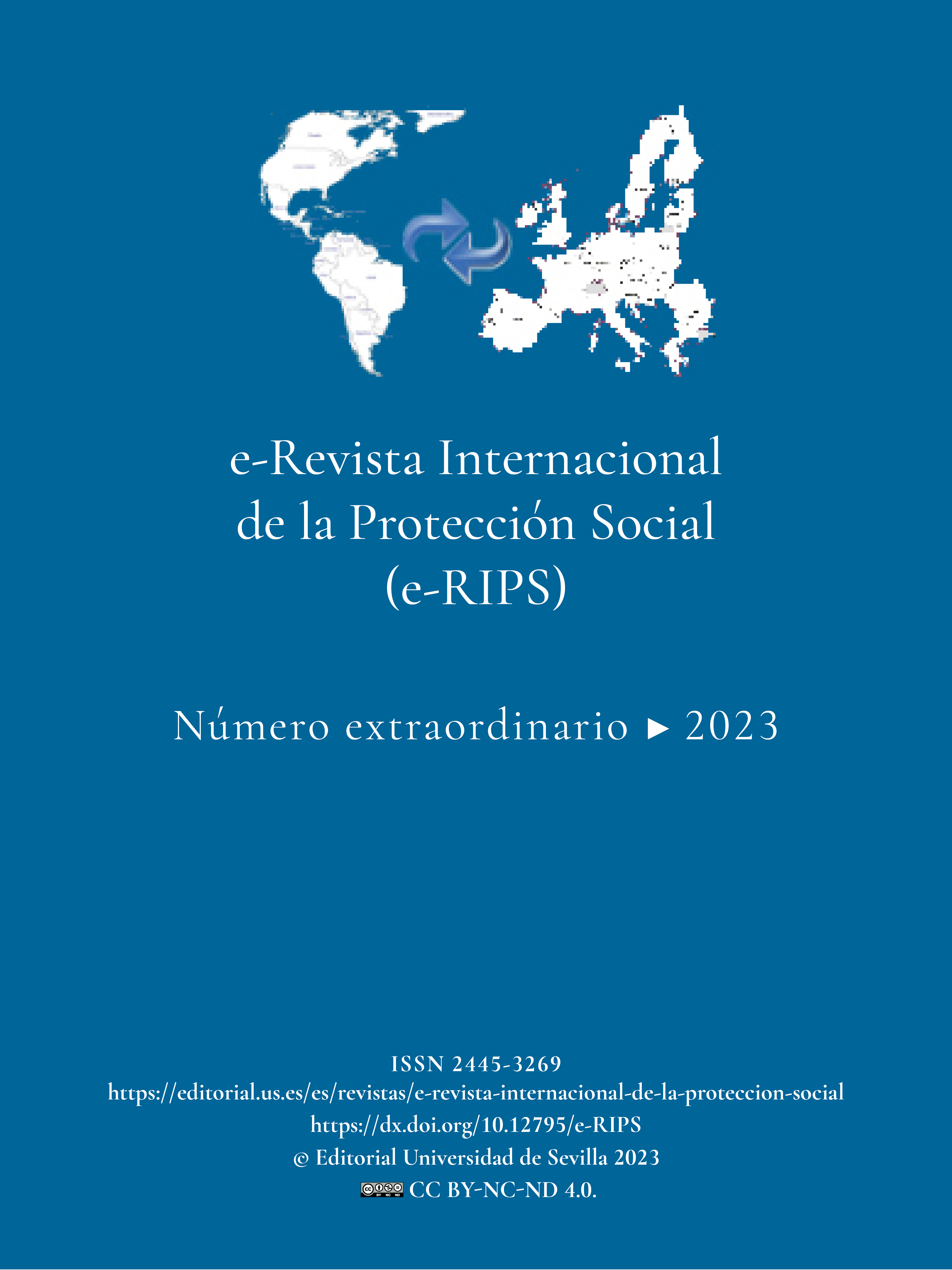Social protection for domestic workers from the Spanish perspective
DOI:
https://doi.org/10.12795/e-RIPS.2023.mon.10Keywords:
Atypical employment, Domestic service, Unemployment, Social Security, Social protectionAbstract
The fact that domestic workers can be considered within the groups of atypical workers is determined by the employment relationship established in this type of activity since, generally, they are not hired by a company that assigns them to different homes, but it is the individuals themselves who “hire” them to come to the family home. This fact means that most of the time there is no real contract, and they are excluded from Social Security coverage, specifically unemployment benefits and temporary disability benefits. In this work we are going to analyze the situation of this group after the publication of Royal Decree-law 16/2022, of September 6, for the improvement of the working conditions and Social Security of home workers.
Downloads
References
Del Campo Gutiérrez, A.: “El status femenino desde el punto de vista del trabajo (Zaragoza, siglo XIV)”. Aragón en la Edad Media, núm.18, 2004.
De Dios Fernández: E. Sirvienta, empleada, trabajadora de hogar. Género, clase e identidad en el franquismo y la transición a través del servicio doméstico (1939-1995), umaeditorial, 2019.
Del Val Valdivieso, M. I.: “Mujer y trabajo en Castilla al final de la Edad Media”, Aragón en la Edad Media, núm. 14-15, 2, 1999 (Ejemplar homenaje a la profesora Carmen Orcástegui Gros).
María e Izquierdo, M. J.: “El Ordenamiento de Montalvo y la Nueva Recopilación”, Cuadernos de Historia del Derecho, núm. 6, 1999 [ejemplar homenaje a don Manuel Torres López (I)].
Hernáiz Márquez, M.: “Antecedentes históricos y legales del servicio doméstico”, Revista de Política Social, núm.41, enero/marzo 1959.
Jimeno Aranguren, R.: Los Fueros de Navarra, Agencia Estatal Boletín Oficial del Estado, Madrid, 2016.
Malo Ocaña, M. Á.: “Nuevas formas de empleo: Del empleo atípico de las Plataformas Digitales”, Papeles de Economía Española, núm. 56, 2015.
Ordóñez Casado, M. I.: “El servicio doméstico desde la perspectiva del concepto de “trabajo decente” propuesto por la OIT”, Revista Internacional y Comparada de Relaciones Laborales y Derecho del Empleo, vol. 9, núm. 4, 2021.
Organización Internacional del Trabajo: El empleo atípico en el mundo. Retos y perspectivas, Ginebra, 2016. Disponible en: https://www.ilo.org/wcmsp5/groups/public/---dgreports/---dcomm/---publ/documents/publication/wcms_534522.pdf.
Poquet Catalá, R.: “Covid-19, crisis sanitaria, económica y laboral: ¿hacia un trabajo decente en el trabajo doméstico?”, Revista Internacional y Comparada de Relaciones Laborales y Derecho del Empleo, vol. 9, núm. 1, 2021.
Vela Díaz, R.: “De la Ley 27/2011 al Real Decreto-ley 29/2012 de mejora de gestión y protección social en el sistema especial para empleados de hogar: la nueva frontera entre las personas trabajadoras al servicio del hogar familiar”, Temas Laborales, núm. 122, 2013.
Published
How to Cite
Issue
Section
License
Copyright (c) 2023 María Iluminada Ordóñez Casado

This work is licensed under a Creative Commons Attribution-NonCommercial-ShareAlike 4.0 International License.
Authors being published in this journal agree to the following terms:
- Authors retain their copyright and they will guarantee to the journal the right of first publication of their work, which will be simultaneously subject to license recognition by Attribution-NonCommercial-ShareAlike (CC BY-NC-SA 4.0 DEED)
that allows others to share such work provided that the author’s name and his first publication in the e-International Review on Social Protection is stated. - Authors may take other non-exclusive distribution license agreements version of the published work (e.g. deposit in an institutional digital file or publication in a monographic volume) provided that the initial publication in this journal is stated.
- Authors are allowed and encouraged to disseminate their work via the Internet (e.g. in institutional digital files or on their website) prior to and during the submission process, which can lead to interesting exchanges and to increase citation of the published work.











